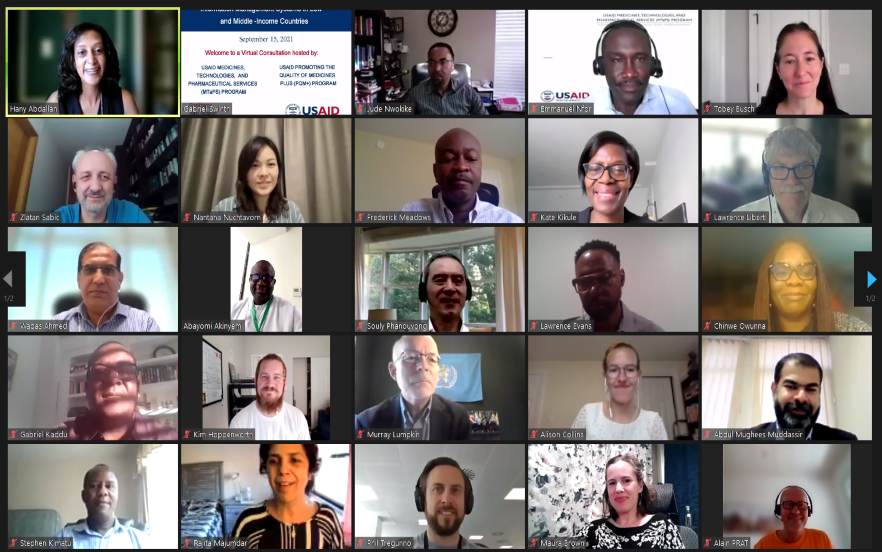Digitalizing Medicines Regulatory Systems: A Small Step Toward a Big Leap
The national regulatory authorities (NRAs) in low- and middle-income countries (LMICs) face compounding challenges in controlling the quality, safety, and efficacy of medical products circulating their markets or passing through their territories—a constraint that seriously compromises health care delivery and health outcomes in the countries. Aside from an array of issues, there’s the persistence of paper-based regulatory processes in LMICs, which prevents the NRAs from functioning effectively and efficiently. In LMICs, an information management system (IMS) for NRAs to regulate medicines is either non-existent, poorly functioning, or not interoperable, which causes core regulatory functions—such as evaluation and registration of medicines and market authorization—to fall prey to lack of transparency, vulnerability to corruption, inefficient workflows, and mismanagement.
To address these challenges, USAID MTaPS and the Promoting Quality of Medicines Plus (PQM+) program are working together—along with partner organizations and the World Health Organization (WHO)—to not only develop Regulatory Information Management Systems (RIMS) software but also to establish minimum common technical process standards upon which all RIMS software can be based. By collaboratively devising a set of minimum common standards for RIMS, NRAs would be able to prioritize and streamline their workflows, maintain documentation of regulatory processes, ensure uniform data capture, and enable data exchange within and between NRAs and other stakeholders. Common standards will ensure NRAs make technical decisions with a degree of consistency and transparency, as well as enhance their abilities to collaborate and share information.
Agreeing on Minimum Common Standards for RIMS Across LMICs
Given the magnitude of effort and resources involved in implementing RIMS and its large implications in Africa and Asia, MTaPS and PQM+ are convening a series of consultations with stakeholders to develop and recommend a set of minimum common standards for RIMS that will enable uniform data capture and standardize the data, design, and workflow of digitalized regulatory functions. Through the consultative process with varied stakeholder groups, MTaPS and PQM+ are aiming to:
- Identify the critical gaps and challenges NRAs and other stakeholders are facing with RIMS
- Use relevant existing RIMS standards to derive a recommended set of minimum common standards for RIMS to address identified gaps and challenges
- Develop the use case for the minimum common standards and help promote their adoption and use
For a rich and rigorous discourse, the consultative process will engage three primary stakeholder groups of RIMS:
- NRAs as the adopters and users of the system
- Global and regional regulatory experts working toward regional regulatory harmonization and regulatory systems strengthening experts for their technical inputs
- Funders who support strengthening of regulatory systems and health systems in general to meet the national and global health goals

Participants in the RIMS workshop
MTaPS and PQM+ kicked off the consultative process, co-hosting their first meeting on September 15, 2021. The meeting convened a cross-section of some 27 participants representative of the three targeted stakeholder groups at the national, regional, and global levels—these included Nigeria’s National Agency for Food and Drug Administration and Control; Ethiopia’s Food and Drug Association; Pakistan’s Drug Regulatory Authority; regional economic communities, such as the Association of Southeast Asian Nations (ASEAN) and the African Union Development Agency-New Partnership for Africa’s Development (AUDA-NEPAD); USAID; Gate Foundation; WHO; the World Bank; and the Global Fund.
The meeting started out with the group unpacking what kinds of standards will need to be established, with the latter part of discussion paving way for consensus building. The group agreed on the need to establish three categories of standards as they apply to three major facets of NRA functioning: process or workflow standards or standard operating procedures; pharmaceutical standard dictionaries and knowledge trees that relate to master reference lists, in order to name and identify various products; and the technical specifics of the IMS and data exchange standards. The group also identified implementation challenges for RIMS but emphasized using experiences and solutions of more mature NRAs as examples to replicate across countries as the continent-wide RMIS initiative progresses.
Establishing minimum standards for RIMS could catalyze RIMS implementation in LMICs—a long-sought- after goal for stakeholders of the national regulatory systems.
“People spend a great deal of time going around in circles in developing and redeveloping and trying to define what they really want in their system at the end. Regulatory harmonization initiatives have been, I think, a somewhat frustrating experience. And I think it’s one of the reasons we are excited about this effort to come up with a set of minimum standards because at the very least, it will help focus people and define individual efforts to develop IT systems,” reflected Murray Lumpkin, Deputy Director, Integrated Delivery and Lead for Global Regulatory Systems Initiatives, Bill and Melinda Gates Foundation, at the meeting.
Next Steps
The consultative process will continue over at least two more meetings, concluding in early 2022 with presentation of the minimum common standards for RIMS as outcomes of the consultative process and a discussion on pathways for countries to adopt minimum common standards to support the digitalization of medicines regulatory functions.
As the group agrees, RIMS will improve transparency, increase trust, and boost efficiency, given that RIMS and common standards will essentially act as a common “language” instead of perpetuating fragmented processes in the regional pharmaceutical sector and will promote a shared outlook of stronger regulatory systems for better access to quality medicines.